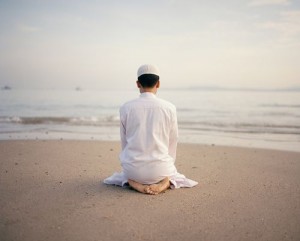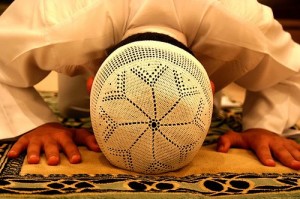Tahajjud Prayer is part of the Sunnah of the Prophet (peace and blessings be upon him), which Muslims are preferred to follow all the time.
In his famous work, Fiqh As-Sunnah, Sheikh Sayyid Sabiq elaborates on the subject as follows:
Ordering His Messenger to perform Tahajjud, Allah Almighty says what means:
{And during a part of the night, pray Tahajjudbeyond what is incumbent on you; maybe your Lord will raise you to a position of great glory.} (Al-Israa’ 17:79)
This order, although it was specifically directed to the Prophet, also refers to all Muslims, since the Prophet is a perfect example and guide for us in all matters.
Moreover, performing Tahajjud Prayers regularly qualifies one as one of the righteous and makes one earn Allah’s bounty and mercy. In praising those who perform the late night Prayers, Allah says what means:
{And they who pass the night prostrating themselves before their Lord and standing.}(Al-Furqan 25:64)
Next to these Quranic verses, there also exist a number of hadiths that reinforce the importance of Tahajjud.
`Abdullah ibn Salam reported:
“When the Prophet (peace and blessings be upon him) came to Madinah, the people gathered around him and I was one of them. I looked at his face and understood that it was not the face of a liar. The first words I heard him say were: ‘O people, spread the salutations, feed the people, keep the ties of kinship, and pray during the night while the others sleep, and you will enter Paradise in peace.’” (At-Tirmidhi.)
Salman Al-Farsi quoted the Prophet (peace and blessings be upon him) as saying:
“Observe the night Prayer; it was the practice of the righteous before you and it brings you closer to your Lord and it is penance for evil deeds and erases the sins and repels disease from the body.” (At-Tabarani)
Etiquette of Prayer
The following acts are recommended for one who wishes to perform the Tahajjud Prayer:
Upon going to sleep, one should make the intention to perform the Prayers. Abu Ad-Darda’ quoted the Prophet (peace and blessings be upon him) as saying:“Whoever goes to his bed with the intention of getting up and praying during the night, but, being overcome by sleep, fails to do that, he will have recorded for him what he has intended, and his sleep will be reckoned as a charity (an act of mercy) for him from his Lord.” (An-Nasa’i and Ibn Majah)
On waking up, it is recommended that one wipes the face, use a toothbrush, and look to the sky and make the supplication which has been reported from the Prophet (peace and blessings be upon him).
Abu Hudhaifa reported:
“Whenever the Prophet intended to go to bed, he would recite: (With Your name, O Allah, I die and I live).” And when he woke up from his sleep, he would say: (All the Praises are for Allah Who has made us alive after He made us die (sleep) and unto Him is the Resurrection.)” (Al-Bukhari)
One should begin with two quick rak`ahs and then one may pray whatever one wishes after that. `A’ishah said:“When the Prophet prayed during the late-night, he would begin his Prayers with two quick rak`ahs.”(Muslim)It is recommended that one wakes up one’s family, for Abu Hurairah quoted the Prophet (peace and blessings be upon him) as saying:“May Allah bless the man who gets up during the night to pray and wakes up his wife and who, if she refuses to get up, sprinkles water on her face. And may Allah bless the woman who gets up during the night to pray and wakes up her husband and who, if he refuses, sprinkles water on his face.” (Ahmad)
The Prophet (peace and blessings be upon him) also said:“If a man wakes his wife and prays during the night or they pray two rak`ahs together, they will be recorded among those (men and women) who (constantly) make remembrance of Allah.” (Abu Dawud.)
If one gets sleepy while performing Tahajjud, one should sleep. This is based on the hadith narrated by Aisha (may Allah be pleased with her), who quoted Allah’s Messenger as saying:“When one of you gets up during the night for Prayer and his Quranic recital gets mixed up to the extent that he does not know what he says, he should lie down.” (Muslim.)
Recommended Time for Tahajjud
Tahajjud may be performed in the early part of the night, the middle part of the night, or the latter part of the night, but after the obligatory `Isha’ Prayer (night Prayer).
While describing the Prophet’s way of performing Prayer, Anas (may Allah be pleased with him) said:
“If we wanted to see him praying during the night, we could see him praying. If we wanted to see him sleeping during the night, we could see him sleeping. And sometimes he would fast for so many days that we thought he would not leave fasting throughout that month. And sometimes he would not fast (for so many days) that we thought he would not fast during that month.” (Al-Bukhari, Ahmad and An-Nasa’i.)
Commenting on this subject, Ibn Hajar says:
“There was no specific time in which the Prophet (peace and blessings be upon him) would perform his late night Prayer; but he used to do whatever was easiest for him.”
Best Time for Tahajjud
It is best to delay this Prayer to the last third portion of the night. Abu Hurairah (may Allah be pleased with him) quoted the Messenger of Allah (peace and blessings be upon him) as saying:
“Our Lord descends to the lowest heaven during the last third of the night, inquiring: ‘Who will call on Me so that I may respond to him? Who is asking something of Me so I may give it to him? Who is asking for My forgiveness so I may forgive him?’” (Al-Bukhari)
Amr ibn Absah (may Allah be pleased with him) reported that he heard the Prophet (peace and blessings be upon him) saying:
“The closest that a slave comes to his Lord is during the middle of the latter portion of the night. If you can be among those who remember Allah the Exalted One at that time, then do so.” (At-Tirmidhi)
The Number of Rak`ahs in Tahajjud
Tahajjud Prayer does not entail a specific number of rak`ahs that must be performed, nor is there any maximum limit that may be performed. It would be fulfilled even if one prayed just one rak`ah of Witrafter `Isha’.
Samurah ibn Jundub (may Allah be pleased with him) said:
“The Messenger of Allah ordered us to pray during the night, a little or a lot, and to make the last of the Prayer the Witr Prayer.” (At-Tabarani and Al-Bazzar)







